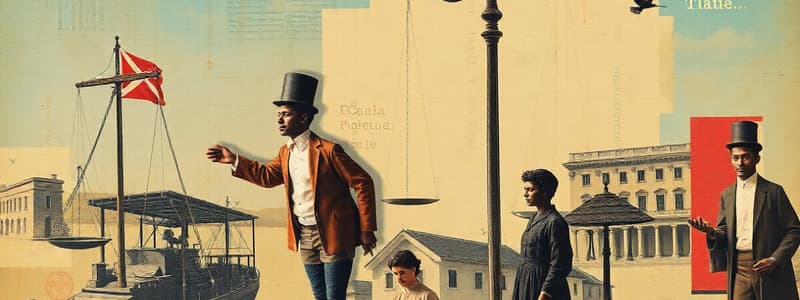Podcast
Questions and Answers
What was one of the primary functions of law in plantation society?
What was one of the primary functions of law in plantation society?
Slavery created a unified legal system for both masters and slaves.
Slavery created a unified legal system for both masters and slaves.
False
What role did the law play in trading and ownership of slaves?
What role did the law play in trading and ownership of slaves?
Slaves were treated as property, could be sold, inherited, mortgaged, and rented out.
The judicial system in the West Indies was primarily an instrument of ______.
The judicial system in the West Indies was primarily an instrument of ______.
Signup and view all the answers
What was the significance of the judicial treatment of slaves in relation to jury trials?
What was the significance of the judicial treatment of slaves in relation to jury trials?
Signup and view all the answers
Capital punishment was used primarily to address crime under slavery.
Capital punishment was used primarily to address crime under slavery.
Signup and view all the answers
What was the outcome of the 1802 attempt to introduce a law making the killing of a slave a felony?
What was the outcome of the 1802 attempt to introduce a law making the killing of a slave a felony?
Signup and view all the answers
What largely determines the historical function of law in the Commonwealth Caribbean?
What largely determines the historical function of law in the Commonwealth Caribbean?
Signup and view all the answers
Why have legal analysts and jurists traditionally overlooked the historical functions of law in the West Indies?
Why have legal analysts and jurists traditionally overlooked the historical functions of law in the West Indies?
Signup and view all the answers
Which of the following describes the initial role of law in Caribbean society?
Which of the following describes the initial role of law in Caribbean society?
Signup and view all the answers
What has been highlighted as a significant aspect of the law's function in West Indian history?
What has been highlighted as a significant aspect of the law's function in West Indian history?
Signup and view all the answers
What characteristic is often attributed to Caribbean law due to its historical context?
What characteristic is often attributed to Caribbean law due to its historical context?
Signup and view all the answers
What aspect of the law is mentioned as rarely addressed in law education for West Indian students?
What aspect of the law is mentioned as rarely addressed in law education for West Indian students?
Signup and view all the answers
What does the term 'norm-building precepts' in the context of Caribbean law refer to?
What does the term 'norm-building precepts' in the context of Caribbean law refer to?
Signup and view all the answers
The judicial system in the West Indies served primarily as which of the following?
The judicial system in the West Indies served primarily as which of the following?
Signup and view all the answers
What was the consequence for slaves found guilty of minor offences in the penal system?
What was the consequence for slaves found guilty of minor offences in the penal system?
Signup and view all the answers
What compensation did slave owners receive upon the execution of a slave?
What compensation did slave owners receive upon the execution of a slave?
Signup and view all the answers
What was the main intention behind the use of capital punishment in relation to the slave system?
What was the main intention behind the use of capital punishment in relation to the slave system?
Signup and view all the answers
What was the nature of the legal perception of slaves within the judicial system?
What was the nature of the legal perception of slaves within the judicial system?
Signup and view all the answers
What was the outcome of the 1802 attempt to introduce a law making the killing of a slave a felony?
What was the outcome of the 1802 attempt to introduce a law making the killing of a slave a felony?
Signup and view all the answers
What was the purpose of the slave laws in plantation society?
What was the purpose of the slave laws in plantation society?
Signup and view all the answers
How were slaves classified under the law?
How were slaves classified under the law?
Signup and view all the answers
Which of the following statements is true regarding the legal structure surrounding slavery?
Which of the following statements is true regarding the legal structure surrounding slavery?
Signup and view all the answers
Which authority had the power to punish slaves in summary proceedings?
Which authority had the power to punish slaves in summary proceedings?
Signup and view all the answers
What was a consequence of the subjugated legal status of slaves?
What was a consequence of the subjugated legal status of slaves?
Signup and view all the answers
What does the statement about the 'survival of the plantation' suggest?
What does the statement about the 'survival of the plantation' suggest?
Signup and view all the answers
In what form could slaves legally be treated in relation to debts?
In what form could slaves legally be treated in relation to debts?
Signup and view all the answers
What implication does the legal classification of slaves as property have on modern legal systems?
What implication does the legal classification of slaves as property have on modern legal systems?
Signup and view all the answers
Study Notes
Historical Function of Law in the West Indies
- West Indian legal education traditionally focuses on European legal theory, overlooking the law's role in the region's history.
- The historical function of law in the Caribbean is essential for understanding its legal systems.
- Plantation society in the West Indies was built on a system of exploitation and inequality.
- Colonial law was used to justify slavery and maintain social control.
- Laws were designed to ensure a constant supply of cheap labor and to prevent social mobility among enslaved people.
- Slaves were considered property, lacking the legal capacity to own property or enter contracts.
- There was a separate legal system for slaves, often involving harsh punishments and denial of basic rights.
- Slaves were not allowed to give evidence against white individuals in court.
- The death penalty was widely applied to slaves, even for minor offenses.
- Slave owners received compensation when their slaves were executed.
- Resistance to slavery was often met with brutal repression.
- Despite the brutal reality, the legal system provided a framework for slave trading, ownership, and inheritance.
The Historical Function of Law in the West Indies
- West Indian law students are taught about legal theories, but often ignore the historical role law played in reinforcing an immoral system of slavery.
- The historical functions of law in the West Indies are crucial to understand the values that shape the current legal system.
- The initiation of law in the Caribbean occurred within a colonial framework, serving as a tool to legitimize plantation society and its exploitative nature.
- The needs of colonial settlers prioritized the maintenance of an unequal society, with law primarily aimed at controlling the black population.
- The law was used to maintain social order and control in plantation society, emphasizing the subordination of enslaved Africans.
- Slave laws were ubiquitous and served to guarantee the economic, social, and racial subordination of Black people.
- Slaves were treated as property, subject to sale, purchase, and inheritance like any other chattel.
- While slaves were considered property, they were legally incapable of owning property or entering into contracts.
- The legal system created a duality with separate laws and institutions for masters and slaves.
- Slaves were subject to separate courts and faced harsher penalties than white individuals.
- Slaves were not allowed to be tried by a jury or give evidence against white people in courts.
- The harsh punishments meted out to slaves were seen as a method of controlling resistance to the slave system.
- Capital punishment was commonly used for minor offenses by slaves, with compensation paid to slave owners for their lost "property."
- An attempt was made to introduce a law making the killing of a slave a felony, but it was defeated.
- The historical analysis suggests that the legal system was deeply intertwined with the perpetuation of slavery and the subjugation of black people.
Studying That Suits You
Use AI to generate personalized quizzes and flashcards to suit your learning preferences.
Related Documents
Description
This quiz explores the historical role of law in the West Indies, particularly within the context of plantation society and colonialism. It examines how legal structures were used to enforce exploitation and maintain social control over enslaved populations. Understanding these legal frameworks is crucial for comprehending the region's current legal systems.




